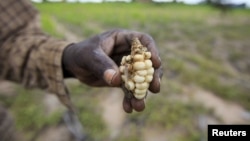Zimbabwe Monday appealed to domestic and international funders for assistance as more than a quarter of its population faces hunger. The United Nations says President Robert Mugabe’s government must invest in irrigation to avert the perennial food shortages.
Zimbabwe says nearly 2.5 million people are facing starvation and blames the problem on the El Nino weather phenomenon that has caused drought in southern Africa.
Zimbabwe’s public works minister, Saviour Kasukuwere, said the government is assessing the situation and working to figure out the required food costs..
"But I am sure we will be able to give the world — locally and internationally — the estimates we are looking at," said Kasukuwere. "But we realize that quite a number have fallen into the drought situation ... for the 2016 [season] and we believe that almost 2.4 million — 26 percent of our population — are food insecure."
Chimimba David Phiri, the southern Africa coordinator with the U.N. Food and Agriculture Organization. said he expects Zimbabwean officials to revise that figure upward as El Nino weather worsens.
He said governments should encourage conservation agriculture so their citizens are less vulnerable to weather changes.
"In addition, we need to increase the area under irrigation," said Phiri. "There are many schemes in Zimbabwe, some dormant that require rehabilitation. Zimbabwe in southern Africa has the highest number of water points, dams, rivers and so on, so there is water in Zimbabwe, perhaps more than any other country in the region which can be used for irrigation. In the past it used to happen; there is no reason why it can’t now."
Zimbabwe, once a breadbasket of southern Africa, has been a net importer of food since the early 2000s. President Mugabe attributes that to recurring droughts in the region; but, critics of the Zimbabwean leader say the country’s controversial land reform program, which forced most experienced white commercial farmers off their land, is causing hunger in the nation.






